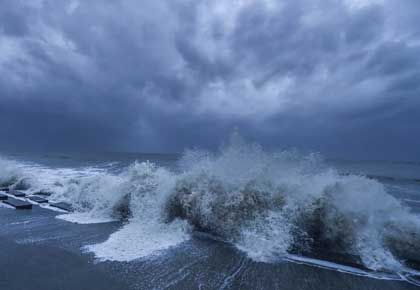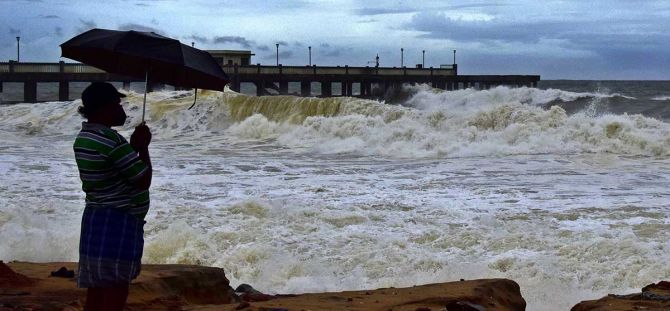
'The food security along the coastal region will be severely affected.'

Climate change is a reality.
It is March, but a deep depression that developed in the Andaman Sea intensified into a cyclonic storm, according to the India Meteorological Department.
Cyclone Asani, as it is named, was predicted to move along and off the Andaman and Nicobar islands and east of Andaman and Nicobar.
Is it due to climate change?
A few weeks ago, the United Nations climate change body released an Intergovernmental Panel on Climate Change (IPCC) report on what kind of impact climate change will have on the human race and the planet, and what should be done to adapt to the situation.
"The Indian Ocean getting warmer can result in both conditions, like reduction in the total rainfall and also heavy rainfall," Dr Roxy Mathew Koll, a climate scientist at the Indian Institute of Tropical Meteorology and a contributor to the IPCC reports, tells Rediff.com's Shobha Warrier.
Is the depression in the Bay of Bengal resulting in Cyclone Asani, because of the warming up of the ocean?
Climate change has increased the number and intensity of cyclones in the Arabian Sea. We do not see such a trend in the Bay of Bengal.
It is quite possible that the warm temperatures in the south Bay are hosting a strong depression. However, this may not live long as a cyclone since the ocean temperatures in the north Bay are not exceptionally warm.
Will such cyclones this be a regular affair at this time of the year?
Since we are taking about Bay of Bengal cyclones, no, we can't say that there's any trend or warning.
For the Arabian Sea, yes there's a strong trend that's projected to increase further into the future.

You wrote about marine heat waves increasing in the Indian Ocean which in turn will have a heavy impact on the rainfall in India.... What are marine heat waves?
Marine heat waves are not waves travelling over the ocean. It is patches of extremely hot water over the ocean which can be 3-4 Celsius or above the normal temperature.
These waves can occur for a few days or weeks or sometimes even months.
In the Pacific, there used to be a famous marine heat wave called the Pacific Blob which remained for one year and resulted in the collapse of the US fisheries in that region.
But we do not have that kind of information on the marine heat waves in the Indian Ocean.
Is this a recent phenomenon?
It has been happening in the last decade or so. Because we don't have enough data on this as there has not been many studies. We need studies on both fisheries and marine heat waves. These studies are lacking in India.
In the Korean region, studies have found that marine heat waves have resulted in mass fish mortalities, and also severely impacted its aqua culture.
Similar things might be happening in the India coast also, but we do not have data on this as there are not many studies.
So, these marine heat waves can affect the livelihood of many people...
Exactly. The food security along the coastal region will be severely affected. It might already be happening.
Along with this, cyclones are also happening. Cyclones affect fishing hours. All these factors might be affecting the coastal community a lot.
When I spoke to you last, you spoke of the Indian Ocean getting warmer. Is it different from marine heat waves?
You have to understand that marine heat waves occur at certain locations like patches of warm water. Its impact is different from the warming of Indian Ocean.
The Indian Ocean getting warmer can result in both conditions, like reduction in the total rainfall and also heavy rainfall.

It was reported that marine heat waves along with El Nino will have a strong impact on the rainfall in this region. In what way?
You see marine heat waves occurring either in the western Indian Ocean or the Bay of Bengal region. Some patches are occurring in the Arabian Sea also.
When marine heat waves occur especially during the monsoon period, the monsoon winds that carry moisture towards the land mass will be instantly pulled to the marine heat wave region. This may result in more rains over the ocean and less rains over the land.
Since a marine heat wave can occur any time, and if it occurs during the monsoon period, it can result in dry conditions over the land.
 IMAGE: Dr Roxy Mathew Koll. Photograph: Kind courtesy Dr Roxy Mathew Koll
IMAGE: Dr Roxy Mathew Koll. Photograph: Kind courtesy Dr Roxy Mathew KollYou mean marine heat wave can result in less rainfall and drought?
We are not sure about the drought part. It depends on the intensity and duration of the marine wave.
What I was talking about was dry conditions over the land.
Yes, there is a possibility of drought if the marine heat wave is huge and lasts for a longer duration during the monsoon. Then it will have a significant effect on the rainfall, maybe it can result in a drought. But that is not explored in our study.
But we have found that rainfall does get reduced due to marine heat waves. For example, it may get reduced in central India especially.
We have not seen it resulting in heavy rainfall.
When you have marine heat waves in the Bay of Bengal, there will be a reduction in the rainfall in the central India and some increase in the rainfall over south India.
Feature Presentation: Ashish Narsale/Rediff.com










